There was plenty for Jorge Claros to take stock of when Honduras arrived back at their base camp in Porto Feliz, 75 miles outside São Paulo, in the early hours of 16 June. A lifetime’s ambition had been put to bed the previous evening, the midfielder making his World Cup bow during the second half of a joyless 3-0 defeat to France. Claros must have known, too, that the game’s biggest talking point had particular significance for him. Wilson Palacios’s rush of blood and subsequent suspension meant there was a reasonable chance that the man referred to as “Pitbull” would start their next match, against Ecuador, in his place. There were four more days to prepare; four days in which to wrap his thoughts fully around the remarkable hand fate had dealt him.
It was the hand that had ensured 16 June would never be just any day for Claros. On that date in 2011, he was driving in the Honduran second city, San Pedro Sula. Life was good. His club, Motagua, had won the league a month previously, beating bitter rivals Olimpia in the title play-off. Claros himself had bigger plans: his new Chevrolet had just been bought from his close friend Emilio Izaguirre, who had left Motagua for Celtic the previous year, and it seemed as if the pair would be reunited soon, with the two clubs negotiating another deal that would give Claros the move abroad that he had long craved. To cap it all, his wife, Elsa, sitting in the passenger seat, had recently become pregnant.
Claros turned off the road to stop at a petrol station and things would never quite be the same. Honduras has the highest murder rate in the world, with 90.4 homicides per 100,000, and San Pedro Sula holds the grim distinction of the being the world’s most violent city, the country’s 1.2 million unregistered guns making it easy for criminals to run amok. This time two of them were waiting for Claros as he pulled up: they wanted the shiny car that Izaguirre had just handed over and, as he attempted to evade their approach by speeding off, they made for their bounty in the only way they knew. Two bullets shattered the windscreen; Claros was struck squarely on the left shoulder by the first, while the second glanced against his head. Elsa, along with a friend sitting in the back, was unharmed.
Eleven months later and half a world away, he would tell Scotland’s Herald newspaper: “I just kept thinking: ‘Don’t panic, just relax.’ But I remember thinking: ‘Oh my God, what is my mother going to say?’ I was shot in the back and also on my head and I still have the bullet wounds. Immediately after it happened I put my finger in a hole in my head and remember the blood pouring down over my face.”
Perhaps showing the kind of clarity that manifests itself in fight-or-flight situations, or maybe conditioned to unthinkable levels of stoicism by his country’s relationship with gun crime (in a bizarre incident the previous year, he had been struck by an air gun pellet fired by his own club’s goalkeeper, Donaldo Morales, during a dispute with a journalist, Saul Carranza), Claros ignored the hole in his head and – somehow – kept driving. He drove on, far from his assailants, until he reached a private hospital, calmly checking himself in and surrendering to the care of a local doctor, Óscar Benítez. “He was very lucky, it can be defined as a miracle,” Benítez told local media the next day, before promising – outlandishly, it seemed – that he would have Claros ready to play football again within three weeks.
Amazingly, Benítez was as good as his word: Claros had come perhaps a couple of millimetres from instant death, but he joined up with Motagua for the new season and, exactly six months after the attack, boarded a flight to Glasgow that had come to seem unthinkable. Rangers, not Izaguirre’s Celtic, were the club interested now – but they would recoil at Motagua’s £800,000 asking price. A chance message relayed to the then Hibernian manager, Pat Fenlon, kept him in the country and resulted in a loan move to Easter Road that would eventually be extended to last a season and a half. His composure in front of the back four became more of an asset than any “Pitbull” attributes (the name would be intermittently replaced by a “Poodle” epithet that was more affectionate than pejorative), but his return to Motagua in May 2013 was welcomed neither by the player nor by Hibernian, who had reportedly offered him a five-year contract in the hope that his club would lower their fee.
A year later and he is with Honduras at the World Cup – but for how much longer? They seemed all too happy to conform to their media image of pantomime villains – largely honed after their bruising friendly draw with England – in the France game, with even their coach, Luis Fernando Suárez, saying that they “ran away from football” in Porto Alegre. Things were much better against Ecuador on Friday; Claros’s presence, in his 51st international, added some composure to a game that at times seemed more akin to the hurly-burly of England’s Championship than a World Cup fixture. But they came up short again, losing 2-1 – meaning that only victory over a fretful Switzerland and a French win over the Ecuadorians, with a swing of preferably five goals achieved, can prevent a third early exit in three World Cup appearances.
Claros must wait to discover the extent of his involvement. Palacios is available again and, while he lacks his deputy’s ability on the ball, is still regarded as one of the team’s leaders. But despite saying before the Ecuador game that “it would be a great responsibility to replace a player like Wilson”, Claros, now 28, is no bit-part footballer: it is testament to his recovery that 23 of his caps have come since his shooting and he was influential in Honduras’ run to the semi-finals of last year’s Concacaf Gold Cup, scoring a crucial injury-time winner against El Salvador. Few can have returned from the brink quite as decisively.
That Claros is in Brazil at all seems like enough of an achievement; should he and Honduras defy the odds yet further it may further bear out the belief that, as he said during his time in Scotland, “God is on my side”. There are further challenges ahead – he allowed his contract with Motagua to run down in order to find another foreign employer and does not currently have a club – but, knowing what we do, it seems safe to assume that he will have the initiative and tenacity to power through yet again.
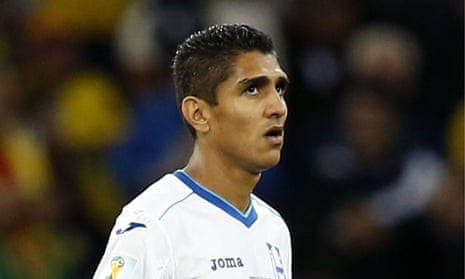

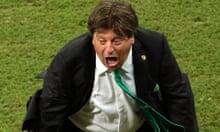
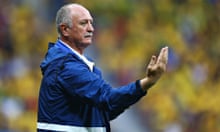
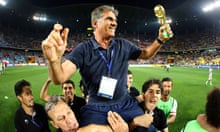
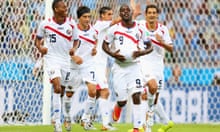
Comments (…)
Sign in or create your Guardian account to join the discussion